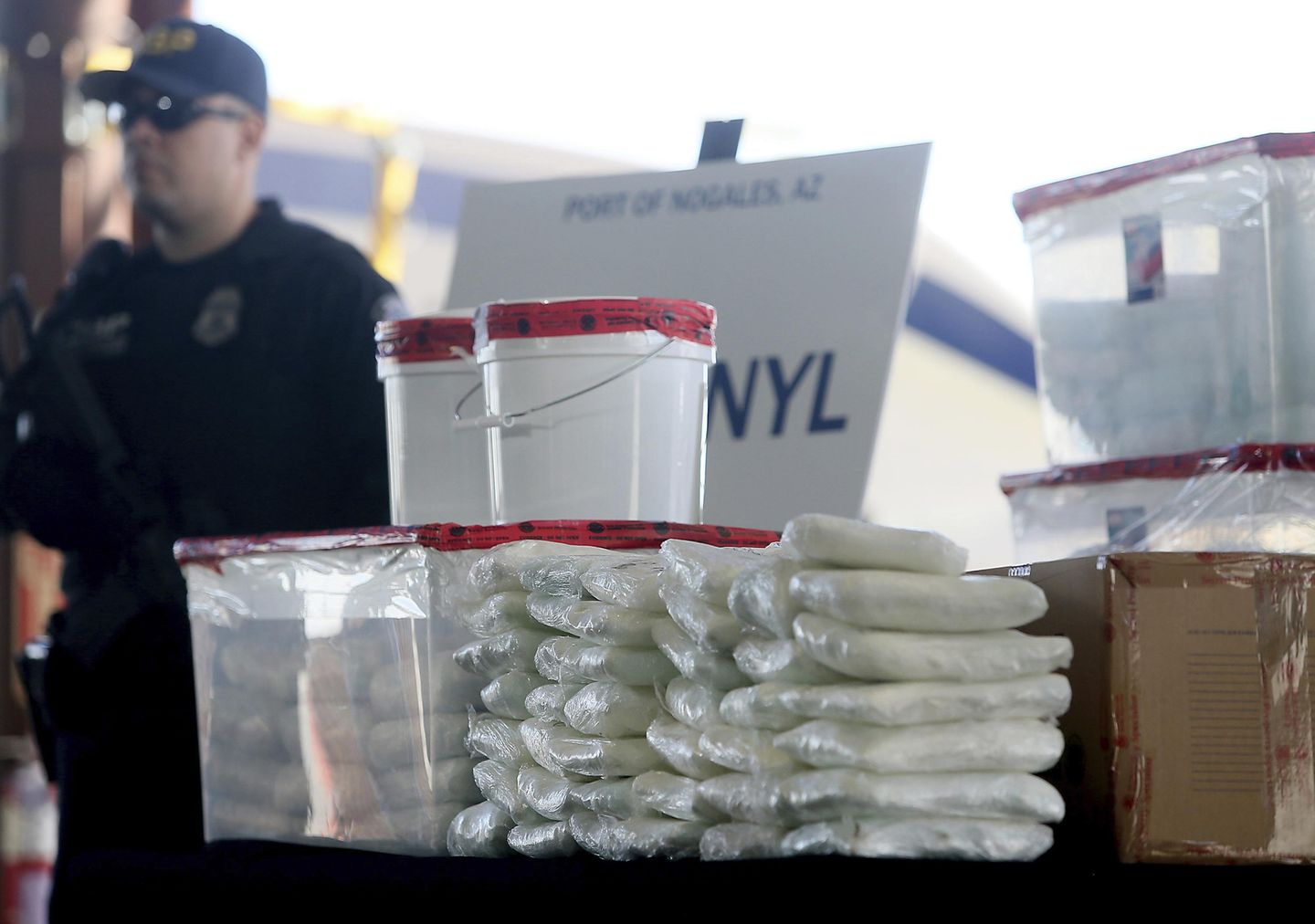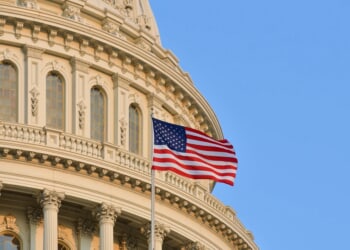
Illegal production and distribution of deadly fentanyl netted traffickers an estimated $1.4 billion in 2024, most of which was funneled through U.S. banks, according to a Treasury Department financial report.
The report by the Financial Crimes Enforcement Network, known as FinCEN, said the estimate is based on 1,246 bank secrecy reports about suspected fentanyl-related activity.
“Mexico and the People’s Republic of China (PRC), the top two foreign countries identified in subject address fields of [Bank Secrecy Act] reports analyzed, play key roles in the production of fentanyl and subsequent money laundering activity,” the report, made public on Wednesday.
The 1970 Bank Secrecy Act requires financial institutions to report suspicious activity and transactions over $10,000.
The Drug Enforcement Administration said 70% of the 107,000 drug overdose deaths in 2023 were the result of abuse of synthetic opioids such as fentanyl.
China’s continuing role in providing precursor chemicals to Mexican drug cartels involved in the fentanyl trade was a major reason President Trump imposed heavy tariffs on Beijing in what is now a full-fledged trade war.
The report identified the main cartels involved in the fentanyl trade as the Sinaloa Cartel and the Cartel Jalisco Nueva Generacion, both labeled as foreign terrorist organizations by the U.S.
The two cartels largely control the fentanyl supply chain in Mexico and use precursor chemicals and manufacturing equipment from China. The drug is produced in clandestine laboratories, the report said.
The operations of the fentanyl trade involve chemical brokers using front companies, money mules and U.S.-based intermediaries who buy fentanyl precursor chemicals from Chinese suppliers.
Treasury Secretary Scott Bessent said in a statement that the FinCEN analysis shows “the information we receive from financial institutions is a critical element in our ability to more effectively investigate and disrupt the malicious actors that profit off this unprecedented epidemic.”
The data “ultimately aids in the effort to save American lives,” he said.
Fentanyl-related activity is linked to the entire supply chain for the drug — precursor chemical purchases, fentanyl trafficking, and fentanyl-linked money laundering, according to the FinCEN report.
It said 57% of the suspicious bank reports on fentanyl trafficking originated from U.S. banks, savings and loan associations, or credit unions. A total of 32% came from check cashing, money orders or similar services.
The activities by the cartels mainly are carried out in Sinaloa and Jalisco, key areas for the Sinaloa cartel and the Cartel Jalisco Nueva Generacion.
Chinese chemical suppliers use e-commerce platforms to market fentanyl precursor chemicals, the report said.
Payments were traced to bank wire transfers and online electronic funds transfers.
In addition to Mexico and China, other foreign nations involved in the fentanyl trade include Canada, the Dominican Republic and India. Those nations have been linked to alternative sources of supply for precursor chemicals and fentanyl, and through illegal online pharmacies.
China remains “the primary source country for fentanyl precursor chemicals and pill press machinery,” with nearly 50% of the chemicals traced to the fentanyl trade located in Guangdong, Zhejiang and Hebei provinces in eastern China, the report said.
The cities of Wuhan and Shijiazhuang were linked to the most banking reports for fentanyl precursor sales.
In the United States, states playing a key role in the fentanyl trade include California, Florida and New York. The three locations provided the most suspicious bank reports and were connected to large urban areas with established drug distribution networks. The areas served as collection points for illicit proceeds.
“FinCEN analysis also noted a substantial number of subjects in southwest border counties in California and Arizona,” the report said.
The traffickers mainly deal in cash and peer-to-peer transfers. Other drug deals bitcoin payments, including in suspected Darknet marketplace drug sales.
Some of the money laundering of fentanyl proceeds took place through professional Chinese money laundering organizations that the report said potentially facilitated “the movement of illicit fentanyl proceeds on behalf of the cartels.”
Chinese groups rely on underground banking that allows Chinese nationals to acquire dollars in the U.S. while evading official curbs on acquiring foreign funds.
In a related action, Treasury this week publicly identified a leader of a Mexican drug trafficking organization linked to a major seizure of fentanyl.
The Office of Foreign Assets Control sanctioned Mexican national Jesus Alfredo Beltran Guzman, a leader of the Beltran Leyva Organization, known as BLO, for his alleged role in trafficking fentanyl, cocaine, heroin and methamphetamine into the U.S., the department said in a statement Wednesday.
The BLO was identified as a group heavily involved in moving and distributing fentanyl into the U.S., as well as ranking among the largest suppliers of cocaine for the past two decades.
“Beltran Guzman and the BLO have continued to operate with violent impunity, trafficking in deadly drugs, threatening communities, and targeting key officials, all while profiting from their criminal schemes,” Mr. Bessent said.
BLO is among the more violent drug organizations and has been linked by authorities to shootouts, murders, kidnappings, torture, and violent collection of drug debts.
In December 2009, for example, gunmen killed the family of a Mexican marine following a military raid that killed Arturo Beltran Leyva, a BLO leader, Treasury said in announcing the sanctions.
In December, Mexican police made the largest seizure of fentanyl in the nation’s history in Sinaloa, netting over a thousand kilos of the drug. That is calculated to amount to 20 million doses of fentanyl.
Jesus Beltran Guzman is known as “El Mochomito” and is the nephew of Joaquin Guzman Loera, the U.S.-imprisoned leader of the Sinaloa Cartel known as El Chapo.
The sanctions against Beltran Guzman are largely symbolic and block all his property and interests in the U.S. The action is mainly designed to make public details of his activities.



![Jasmine Crockett Justifies Mass Illegal Immigration With Bizarre Argument [WATCH]](https://www.right2024.com/wp-content/uploads/2025/03/1742007023_Jasmine-Crockett-Justifies-Mass-Illegal-Immigration-With-Bizarre-Argument-WATCH-350x250.jpg)

![Red Sox Fan Makes the ‘Catch of the Day’ with Unconventional ‘Glove’ [WATCH]](https://www.right2024.com/wp-content/uploads/2025/04/Red-Sox-Fan-Makes-the-‘Catch-of-the-Day-with-350x250.jpg)
![NYC Tourist Helicopter Falls into Hudson River, Siemens Executive and Family Among Those Killed [WATCH]](https://www.right2024.com/wp-content/uploads/2025/04/NYC-Tourist-Helicopter-Falls-into-Hudson-River-Siemens-Executive-and-350x250.jpg)









